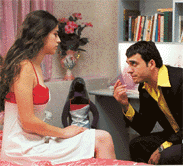Late Marriage (Dover Koshashvili) 2002
 Set in Isreal, Late Marriage, the
first film from director Dover Koshashvili, follows the exploits of a displaced
Georgian family as they attempt to arrange the marriage of their 31-year old
son. What begins as a quirky comedy of errors, with Zaza (Lior Ashkenazi), its
protagonist, placed in awkward situations due to his relatives’ insistence
that he needs a wife posthaste, slowly becomes something more harrowing as the
realization that more that just his own happiness is at stake grows unavoidable.
The principles of the family are based on a dogma that lies somewhere between
religious conviction, tradition, and pure stubbornness, and as a result,
there’s apparently little room for them to budge, especially when the real
reason for the son’s reluctance to marry is revealed. The father says, “We
follow our head, not our heart,” but there are obviously emotional stakes to
be considered here. As such, the film manages to tweak many sensitive issues
during its running time, even if it’s hard to shake the feeling that such ado
is excessive, considering the circumstances.
Set in Isreal, Late Marriage, the
first film from director Dover Koshashvili, follows the exploits of a displaced
Georgian family as they attempt to arrange the marriage of their 31-year old
son. What begins as a quirky comedy of errors, with Zaza (Lior Ashkenazi), its
protagonist, placed in awkward situations due to his relatives’ insistence
that he needs a wife posthaste, slowly becomes something more harrowing as the
realization that more that just his own happiness is at stake grows unavoidable.
The principles of the family are based on a dogma that lies somewhere between
religious conviction, tradition, and pure stubbornness, and as a result,
there’s apparently little room for them to budge, especially when the real
reason for the son’s reluctance to marry is revealed. The father says, “We
follow our head, not our heart,” but there are obviously emotional stakes to
be considered here. As such, the film manages to tweak many sensitive issues
during its running time, even if it’s hard to shake the feeling that such ado
is excessive, considering the circumstances.
Perhaps
though, my impression that the mores of these people shouldn’t matter as much
as they do demonstrates just how foreign Late
Marriage’s sensibilities are to me. I really knew next to nothing about
Georgian customs going into the film, and as I watched it, I expected the events
to follow a relatively safe trajectory, and was quite surprised when things
didn’t pan out as I had predicted. I think it is a mistake to view the film as
an indictment of the customs that it showcases. Zaza is nothing less than
opportunistic in his decision to use his family’s beliefs to get out of the
bad situation that he put himself in, and in the long term, he seems to
understand the wisdom that his family is preaching. The tragedy in the movie
lies in Zaza’s transgression, not in his decision to reenter the fold, and
that’s about as far from a Hollywood ending that’s possible, given this
subject matter, which would be a standard romantic comedy in other hands. It’s
not at all surprising when it comes to light that the same ideals that the
family defends are the main reason that they are still together, but the film
never seems to call that bluff.
 There are some elements of the film that disturbed me, no
matter what my level of cultural knowledge might be. First and foremost, the
director’s approach is far too stagy to achieve the desired effect. What is
supposed to be the family’s emotional frenzy feels artificial because of a
stylistic choice that results in characters that rarely speak over each other.
The camera remains static, and the set-ups are less than visually inspiring.
Even the extended sex scene that takes place midway through the film has a
perfunctory, calculated feel surrounding it. One need only look to Milos
Forman's masterful Loves of a Blonde to see how this sort of scene can be
more successfully accomplished. Nothing feels spontaneous here, and
since family dynamics are interesting precisely because the clash of
personalities and assigned roles sends sparks flying, that sluggishness is
deadly. Looking at the movie as a reassertion of its customs, its inability to
question the fallacies inherent in the family’s stance (especially their
insistence that adhering to such a tradition is “thinking with the head and
not the heart”) seems a glaring flaw. As such, Late
Marriage seems, like its protagonist, lost in a sea of its own ambivalence.
There are some elements of the film that disturbed me, no
matter what my level of cultural knowledge might be. First and foremost, the
director’s approach is far too stagy to achieve the desired effect. What is
supposed to be the family’s emotional frenzy feels artificial because of a
stylistic choice that results in characters that rarely speak over each other.
The camera remains static, and the set-ups are less than visually inspiring.
Even the extended sex scene that takes place midway through the film has a
perfunctory, calculated feel surrounding it. One need only look to Milos
Forman's masterful Loves of a Blonde to see how this sort of scene can be
more successfully accomplished. Nothing feels spontaneous here, and
since family dynamics are interesting precisely because the clash of
personalities and assigned roles sends sparks flying, that sluggishness is
deadly. Looking at the movie as a reassertion of its customs, its inability to
question the fallacies inherent in the family’s stance (especially their
insistence that adhering to such a tradition is “thinking with the head and
not the heart”) seems a glaring flaw. As such, Late
Marriage seems, like its protagonist, lost in a sea of its own ambivalence.
* *
04/25/02
Jeremy Heilman